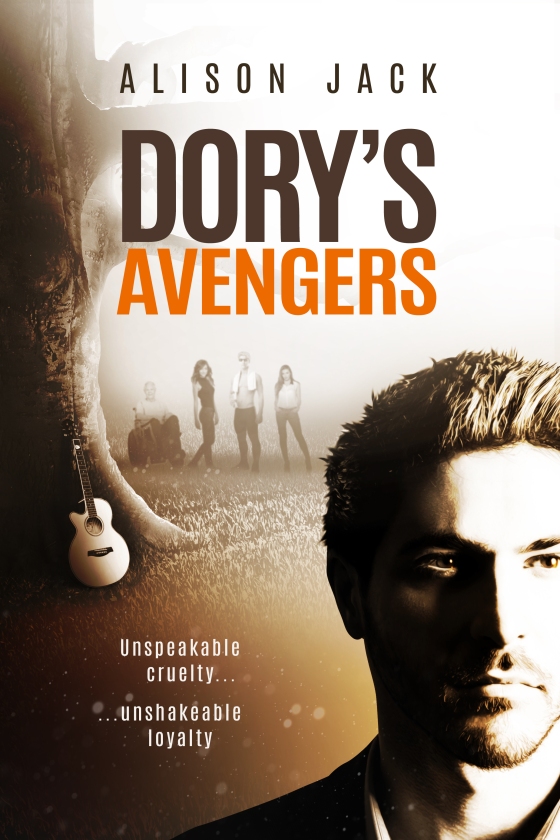In my home county of Cambridgeshire is one of the UK’s most successful gymnastics clubs. From its humble beginnings in 1976 when founder Terry Sharpington coached a few gymnasts in a local school, Huntingdon Gymnastics Club has expanded massively over the years to become the highly successful enterprise it is now, training hundreds of people of all ages and producing winners of four Olympic, five World, six Commonwealth and over twenty European medals.
Being a keen writer, I recently came up with a new angle for my blog, and the more I considered it, the more I liked it. Thanks to the ever-increasing success of British gymnastics, the sport is developing a healthy following both locally and nationally, and since the lead character in my debut novel Dory’s Avengers is a gymnast, I have a keen interest in it too. Approaching the staff at Huntingdon Gymnastics Club, I offered my services and suggested I post a blog for them, perhaps leading to a regular feature about the gymnasts, coaches, events.
To my delight, I received an enthusiastic response, which was what led to me travelling to Huntingdon on a sunny Tuesday afternoon to meet with head coach, Paul Hall.
Taking me on a brief tour, Paul pointed out the original buildings and the parts that have been added on since the club moved to its current location in 1982. As we walked around, I was struck by how cheerful everyone seemed, from the group of toddlers leaping about in the newest section to the steady stream of office staff and coaches flitting past as I bombarded Paul with questions. The whole vibe of the club is warm and friendly – it drew me in and made me want to get involved, and so I would if I were younger and more agile. However, being about as flexible as the average plank of wood, I think it’s probably safer if I stick to what I know and participate in the world of gymnastics by sharing my interview with Paul instead.
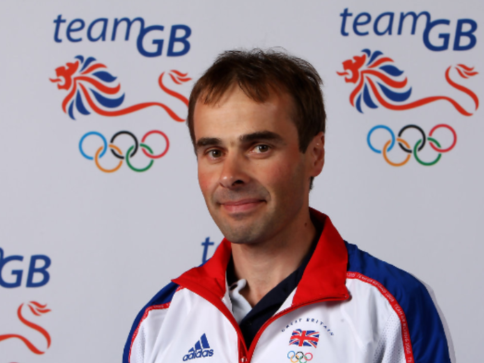
Huntingdon Gymnastics Club head coach, Paul Hall
Alison: Good afternoon, Paul. Thank you for agreeing to answer a few questions for me today. I’m interested to know what got you into gymnastics in the first place.
Paul: Like most kids of my day, I loved climbing trees and getting up to mischief, going on all sorts of adventures, and I liked jumping around. There was a local gymnastics club that my mum took me to as I’d worn out all the springs on her bed and sofas, so I started off as a gymnast there. I immediately fell in love with the sport, couldn’t get enough of it, was doing gymnastics in the lunchtime club, the after school club, and then in the evening club as well.
Alison: Was that here in Huntingdon?
Paul: No, that was in Castle Point in southeast Essex. We were in a little school hall, and that’s where I started – humble beginnings. I wasn’t a particularly good gymnast as I had very stiff shoulders, I wasn’t very flexible, but I loved being thrown around.
Alison: That must help! So tell me about your coaching career. When did you start coaching?
Paul: I was a gymnast up until I was about 18 years old, and then the coach who was working with me decided to retire and the club was going to close down. Rather grudgingly I decided to take on a basic coaching course just so that we could keep the club going and I could assist with running it. So I started a little reluctantly, but I gradually got more and more interested as I realised it was just as much fun teaching people to do things as it was doing them myself. I worked as a volunteer, part time as well as doing a regular job, until I was about 25 years old when I got a full time coaching job in Kings Lynn, Norfolk. That was my first proper gymnastics job, and I worked there for a couple of years before moving to Huntingdon. I’ve been at Huntingdon for the best part of 23 years.
Alison: What was it that encouraged you to get involved at Huntingdon?
Paul: Well, I knew the guy who was here before me, Terry Sharpington, a very charismatic man. I knew him on the regional circuit, I’d been to squads and he’d coached me as a boy, and I was inspired by him. He would often invite me to come and work for him, saying he’d give me a job one day. And so I left Kings Lynn and turned up on his doorstep all those years ago, saying, ‘I want to start working here [Huntingdon].’
Terry didn’t immediately have the money for me so I spent the first 3 or 4 months living in his house and working free of charge in the gym, just getting my board and lodgings. But I liked Terry, I liked the club. At the time it was one of the top clubs in the country – it still is – and had produced some high level girl gymnasts, but hadn’t really had too much of an impact on the boys’ side, so I was there to try and grow the boys’ circuit.
Alison: What do you look for in a young gymnast?
Paul: I like to think we take all shapes and sizes here. If you’re talking about elite, high-level gymnasts they have to conform to certain physical parameters such as being slightly shorter or slightly smaller than average, but overall they’ve got to be tenacious, hard-working, disciplined. They’ve got to be brave above anything else, so I look for people who like challenges, who like to try scary things, and who are quite flexible and naturally strong. But the club caters for people who aren’t like that as well, which is one of the great things about gymnastics. We provide a service for gymnasts with a disability, young children, older children, adults up to 60+ years old, and as I said, all shapes and sizes.
Alison: What would be your advice to anyone wanting to take up the sport?
Paul: I think it’s a super foundation sport. It’s one of the best sports that anybody, certainly any child, can start off with, and it can be a springboard into other sports. Gymnastics teaches the basic locomotor skills that people use for football, basketball, rugby and general life, so I’m a great advocate of the sport.
Alison: What is (are) your most memorable or proudest moment(s)?
Paul: Ah, what a question that is! Most people will think about the Olympics and the successes we’ve had there, and they were proud moments, but it’s quite funny that the moments which stay with me more than any are the ones people don’t realise. I remember a guy in his twenties from a special needs group that I was working with. I’d spent the best part of a year trying to get him to walk from one end of the balance beam to the other, and after a year he did it and jumped off, and the smile on his face…I’ll probably remember that for ever.
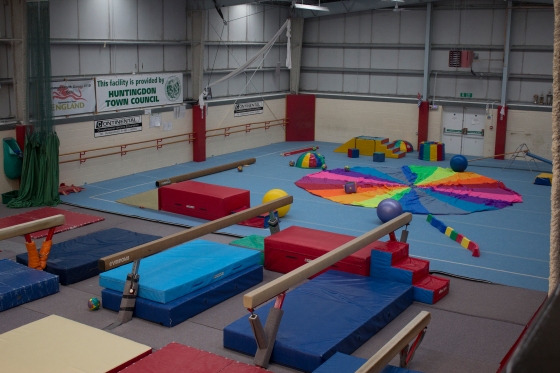
I think it might have been one of the proudest moments I’ve ever had in the gym. That sense of achievement was as good as Louis [Smith] winning an Olympic medal.
Alison: I can imagine! Now I’d like to hear about a typical day at the club. How many training sessions do you take? Are you involved directly with the gymnasts or more with coordinating the other coaches?
Paul: There’s no typical day at the club really. Every day’s different. Now I am more of a coordinator, I try to act as a head coach, giving advice to the staff, and we hold coaching clinics once a week to give them some ideas to make the sessions more interesting and fun. I’m often solving problems in terms of making sure that we cover sessions adequately, making sure that we head to competitions and all the necessary administration that’s involved with the sport, but yes, I still retain a lot of hands-on work. Normally I’ll arrive about lunchtime and there’ll be some of our elite gymnasts in the gym to have a session in a quieter environment between twelve and three o’clock. Then there’ll be an hour’s administration before the main part of the day when the kids finish school and come to the gym. Our gym is then busy right through until nine, nine-thirty in the evening while we work with a whole group of people – up to sixty gymnasts an hour for five hours.
Alison: Sounds pretty intense.
[Short silence while the inept interviewer loses her place in the questions.]
Alison (finally): How often are Huntingdon gymnasts involved in competitions?
Paul: Again it varies between the girls and the boys, but I’d say once they get onto the competition treadmill and start to compete at 10+ years old, they might have four or five competitions a year.
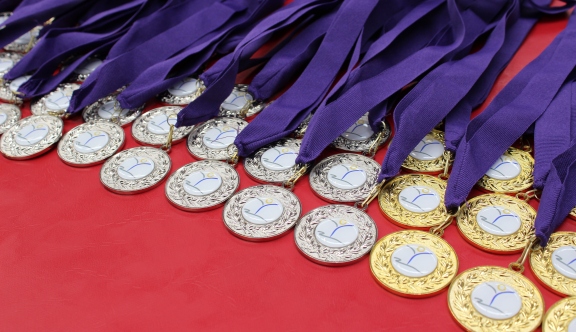
Medals! Medals! Medals!
We try to make it two seasons, although it doesn’t quite work like that, but normally there’s a busy period between September and November where they go to regional or national competitions, then there’s a break when they’ll prepare new elements over Christmas, January and February. The next period’s normally March and April with another round of competitions, and through the summer we’ll prepare again ready for the autumn season.
Alison: How do you help the gymnasts prepare?
Paul: Well it’s mainly learning new elements. It involves making them stronger, so we push them hard on conditioning and flexibility, and we test them once a month to make sure that they’re going in the right direction. There are certain compulsory exercises that each age group has to do, and our job is to keep up with that. As they get older, the elements get more difficult, more complex, and it’s hard to maintain that level of training. Some gymnasts might take a detour into another area of our club; they might go into freestyle or acro or display work, while others continue on the competitive pathway right up to national level and beyond. We do have some international adult gymnasts who you’ve probably heard about.
Alison: I certainly have, yes. Continuing the competition theme, do you host competitions here at Huntingdon, or is it purely training?
Paul: We do occasionally, but it’s not the best venue for spectators. There is a balcony upstairs, but it’s not ideal for competitions as we can’t get too many seats in. We’ve had county competitions and displays here, with parents craning their necks to see over the top of each other and watch their children. But while it’s not the perfect competition venue, it’s a very good training venue.
We normally go to Ipswich for the regional competitions, then all around the country and around the continent for the other competitions.
Alison: Do you travel with the gymnasts?
Paul: Mostly they’ll travel with their parents and we’ll drive there ourselves. Certainly when I was working internationally, I had many years of travelling every month to various countries for competitions, so I’m very well-travelled.
Alison: That must be pretty exciting.
Paul: It is, yes, very.
Alison: And finally, what are the club’s plans for the future?
Paul: We’ve had a frenetic two years of expansion since we built the new hall and there’s been a period of consolidation to get more staff in to cope with the vast numbers of members. We have 1,500+ members and a waiting list of some 500. We’re getting to a position now where we can stabilise the staffing and cope with the numbers, and then we have to think long term about expanding still further to cope with the demand and build up our elite programme. We want to continue to challenge at the very highest level of the sport on both the women’s and the men’s side, and hopefully produce more Olympic medals.
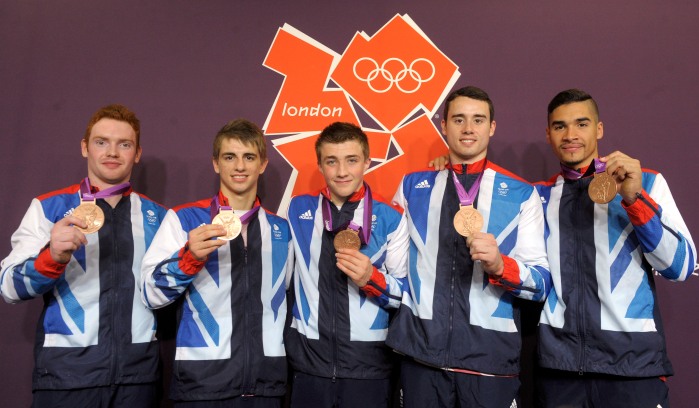
The bronze medal-winning men’s gymnastics team, London 2012 Olympic Games, including Huntingdon gymnast Louis Smith
Alison: An ambition I’m sure all Team GB fans will applaud! Well, that’s wound up my questions. Thank you very much for talking to me today, Paul.
I left Huntingdon Gymnastics Club with a spring in my step. Despite my interest in gymnastics having grown hugely since I first wrote Dory’s Avengers, I’d never had any contact with people who are actually involved in the sport before, and I’m not sure what I expected. What I found was a bunch of people, coaches and gymnasts alike, who are inclusive, enthusiastic, and best of all rejoice in each other’s achievements, recognising that however small those achievements may seem to others, they are huge to the person who’s worked so hard to succeed.
At Huntingdon, everyone who enjoys the sport is welcome.
To find out more about Huntingdon Gymnastics Club, please visit their website. You can also follow the club on Twitter and Facebook.
All photographs supplied by and used with kind permission of either Huntingdon Gymnastics Club or Paul Hall.
